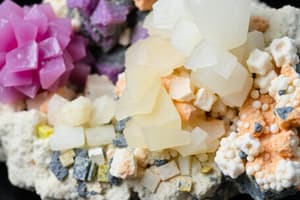Podcast
Questions and Answers
What do geothermal engineers need to understand about the composition of fluids injected into the geothermal reservoir?
What do geothermal engineers need to understand about the composition of fluids injected into the geothermal reservoir?
Chemical interactions between fluids, rock minerals and gases during stimulation and operation, and how compositions change throughout the lifetime of the site.
What are the main types of evidence geologists have used to learn about Earth's interior?
What are the main types of evidence geologists have used to learn about Earth's interior?
Direct evidence from rock samples and indirect evidence from seismic waves.
When did the Earth and the other planets accrete according to the text?
When did the Earth and the other planets accrete according to the text?
About 4.6 billion years ago from a vast cloud of dust and gas.
What caused the high temperatures inside Earth as mentioned in the text?
What caused the high temperatures inside Earth as mentioned in the text?
Signup and view all the answers
What are the potential effects that changes in fluid compositions may lead to in a geothermal reservoir?
What are the potential effects that changes in fluid compositions may lead to in a geothermal reservoir?
Signup and view all the answers
What is the study of the chemical composition of the materials found in the subsurface of the Earth?
What is the study of the chemical composition of the materials found in the subsurface of the Earth?
Signup and view all the answers
What do we typically consider in the context of geothermal engineering regarding geochemistry?
What do we typically consider in the context of geothermal engineering regarding geochemistry?
Signup and view all the answers
What is the study of the chemical composition of natural waters?
What is the study of the chemical composition of natural waters?
Signup and view all the answers
What are some unusual characteristics of many deep geothermal fluids?
What are some unusual characteristics of many deep geothermal fluids?
Signup and view all the answers
What can be important in many contexts regarding the composition of dissolved gases in deep geothermal fluids?
What can be important in many contexts regarding the composition of dissolved gases in deep geothermal fluids?
Signup and view all the answers
Study Notes
Fluid Composition in Geothermal Reservoirs
- Geothermal engineers need to understand the composition of fluids injected into the geothermal reservoir to prevent damage to the reservoir or the surrounding rocks.
Understanding Earth's Interior
- Geologists use seismic waves, gravity anomalies, magnetic field variations, and laboratory experiments to learn about Earth's interior.
Formation of Earth and Planets
- The Earth and other planets are thought to have accreted around 4.5 billion years ago.
Earth's Internal Heat
- High temperatures inside Earth are caused by primordial energy left over from the planet's formation and radioactive decay of elements in the Earth's core.
Effects of Fluid Composition Changes
- Changes in fluid compositions in a geothermal reservoir can lead to mineral precipitation, porosity changes, and altered reservoir permeability.
Geochemistry
- The study of the chemical composition of materials found in the subsurface of the Earth is known as geochemistry.
- In geothermal engineering, geochemistry considers the chemical interactions between fluids and rocks in the reservoir.
Hydrochemistry
- The study of the chemical composition of natural waters is known as hydrochemistry.
Characteristics of Deep Geothermal Fluids
- Many deep geothermal fluids have unusual characteristics, such as high salinity, high temperature, and high gas content.
Dissolved Gases in Deep Geothermal Fluids
- The composition of dissolved gases in deep geothermal fluids can be important in many contexts, as it can affect the reservoir's behavior and the power plant's efficiency.
Studying That Suits You
Use AI to generate personalized quizzes and flashcards to suit your learning preferences.
Description
Test your knowledge of geochemistry and hydrochemistry with this quiz. Explore the study of the chemical composition and processes of the Earth's crust (geochemistry) and the chemical characteristics of water bodies (hydrochemistry).




